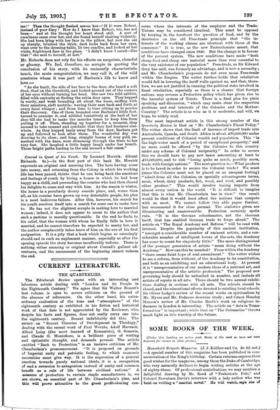C URRENT LITERATURE.
'111e.. QUARTERLIES.
The Edinburgh Review opens with an interesting and laborious article dealing with "London and its People in the Eighteenth Century." We agree that Sir Walter Besant's last volume is open to severe criticism on the ground of the absence of references. On the other hand, his extra- ordinary realisation of the tone and " atmosphere" of the eighteenth century as exhibited in his fiction and historical Work of that date is not appreciated by the Reviewer, who, despite his facts and figures, does not really carry one into the eighteenth century. Besant indubitably did this. The review on "Recent Theories of Development in Theology," dealing with the recent work of Paul Weenie, Adolf Harnack, Alfred Loisy (the most learned of Romanists), G. Semeria, and Claude G. Montefiore, is a brilliant piece of writing and optimistic thought, and demands perusal. The article entitled "Back to Protection" is an incisive criticism of Mr. Chamberlain's pronouncement. "It is proposed on grounds of Imperial unity and patriotic feeling, to which economic necessities must give way. It is the expression of a general reaction towards purely national ideals, it is a recognition of and a reversion to antagonism instead of amity and common benefit as a rule of life between civilised nations." A measure of protection to certain staple manufactures is, we are shown, an essential part of Mr. Chamberlain's plan, and this will prove attractive to the great profit-sharing con- earns where the interests of the employer and the Trade- Unions may be considered identical This must be opposed by keeping in the forefront the question of food, and by 'the insistence on the old Free-trade principle that " the in- terests of the working classes are identical with those of the consumer." It is true, as the new Protectionists assert, that conditions have changed since 1840. But the change is in favour of the present system. The new conditions have made "both cheap food and cheap raw material more than ever essential to the very existence of our population." Free-trade, as Sir Edward Grey has said, was formerly an advantage, and is now a necessity ; and Mr. Chamberlain's proposals do not even mean Free-trade within the Empire. The writer further holds that retaliation would fail in lowering the tariff walls against us, and that, there- fore, we are not justified in running the political risks involved in fiscal retaliation, especially as there is a chance that foreign nations may reverse a Protective policy which has given rise to the harmful system of Trusts. There is a final plea for plain speaking and discussion, "which may make clear the respective positions and real interests of the Colonies and the Mother- Country." The article is as wise as it is moderate, and will, we hope, be widely read.
The most important article in this strong number of the Quarterly Review is that on " Mr. Chamberlain's Fiscal Policy." The writer shows that the limit of increase of import trade into Australasia, Canada, and South Africa is about .230,000,000 under present conditions of Colonial wealth and population. This "is the high-water mark of a period of exceptional prosperity," and no more could be offered " by the Colonies to this country under any scheme of Colonial reciprocity." In order to secure this we should have to pay new taxes amounting at least to .t15,000,000, and to risk "losing quite as much, possibly more, trade with foreign nations." The next question is,—What produce is to be taxed in order to secure the Colonial trade ? We must (since the Colonies must not be placed on an unequal footing) " admit from all the Colonies, on specially advantageous terms, meat, wheat, dairy products, fish, wood, and wool, and possibly other produce." This would involve taxing imports from almost every nation in the world. "It is difficult to imagine that this is what Mr. Chamberlain has in view." One result would be that it would least affect the nations that compete with us most. We cannot follow this able paper further, but recommend it for close perusaL The statistics given are illuminating and unanswerable. Protection certainly spells ruin. "It is the German schoolmaster, not the German tariff, that has enabled German trade to forge ahead." The article on " The Royal Academy and Reform " will be read with interest. Despite the popularity of this ancient institution, " amongst a considerable number of eminent artists, and a con- siderable number of intelligent lovers of the arts, the Academy has come to count for singularly little." The more distinguished of the younger generation of artists "mean doing without the Academy." How can this be mended ? From within the Academy " there seems faint hope of real amendment." The writer wishes to see a reform, from without, of the Academy in its constitution, and both as an exhibiting and an educational body. At present it is "unrepresentative of our modern ideas of a national art, and unrepresentative of the artistic profession." The proposed new governing body should be unlimited in number, and include all artists of repute in all arts. There should be two annual exhibi- tions dealing in sections with all arts. The schools should be closed, and the educational efforts devoted to existing local schools. Sir Oliver Lodge's review of the recent works on spiritualism by Mr. Myers and Mr. Podmore deserves study ; and Canon Hensley Henson's review of Mr. Charles Booth's work on religious in- fluences in London is interesting. The article on " Asia in Trans- formation" is important ; while that on "The Submarine" throws much light on this warship of the future.






































 Previous page
Previous page